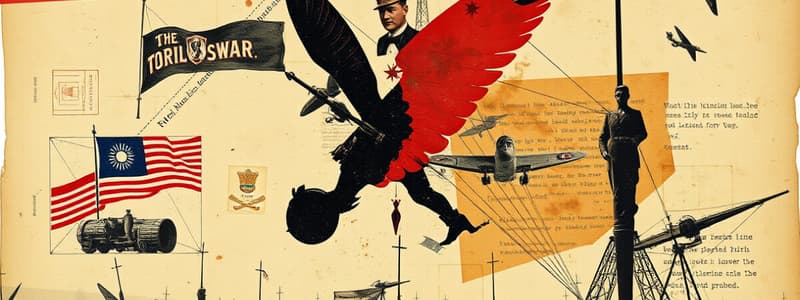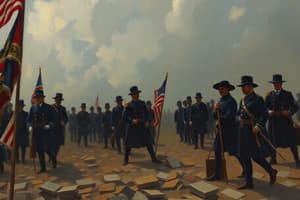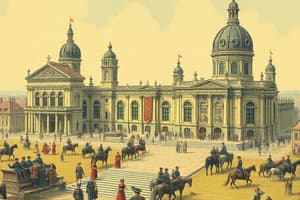Podcast
Questions and Answers
What was the Triple Alliance?
What was the Triple Alliance?
- An alliance formed by Germany, Austria-Hungary, and Italy (correct)
- An alliance formed by France, Russia, and Great Britain
- An alliance that opposed the Central Powers
- An alliance that included Great Britain, France, and Serbia
Which countries were part of the Triple Entente?
Which countries were part of the Triple Entente?
- Germany, Great Britain, and Serbia
- Germany, Austria-Hungary, and Italy
- Italy, Serbia, and Russia
- France, Russia, and Great Britain (correct)
Who were the Allied Powers?
Who were the Allied Powers?
Great Britain, France, Russia, and Serbia
What were the Central Powers?
What were the Central Powers?
Who was Archduke Franz Ferdinand?
Who was Archduke Franz Ferdinand?
Total war means only the military resources are utilized.
Total war means only the military resources are utilized.
What is propaganda?
What is propaganda?
What are U-boats?
What are U-boats?
What is an armistice?
What is an armistice?
Who was President Woodrow Wilson?
Who was President Woodrow Wilson?
What were the Fourteen Points?
What were the Fourteen Points?
What was the Treaty of Versailles?
What was the Treaty of Versailles?
What is nationalism?
What is nationalism?
The four main factors that caused WW1 were _______, _______, ________, and _______.
The four main factors that caused WW1 were _______, _______, ________, and _______.
What was the problem with militarism?
What was the problem with militarism?
What are alliances?
What are alliances?
What does imperialism refer to?
What does imperialism refer to?
What was trench warfare like?
What was trench warfare like?
Why is WW1 referred to as a 'World War'?
Why is WW1 referred to as a 'World War'?
Flashcards are hidden until you start studying
Study Notes
Alliances
- Triple Alliance: Alliance formed by Germany, Austria-Hungary, and Italy, known as the Central Powers during WW1.
- Triple Entente: Alliance including France, Russia, and Great Britain, later known as the Allied Powers, formed to counter the threat posed by Germany.
- Allied Powers: Included Great Britain, France, Russia, and Serbia during the war.
- Central Powers: Comprised Germany and Austria-Hungary.
Key Individuals
- Archduke Franz Ferdinand: Heir to the Austrian throne, assassinated in Sarajevo by a member of the Serbian terrorist group "The Black Hand," igniting tensions leading to WW1.
- President Woodrow Wilson: U.S. president known for his peace efforts during WW1, including his proposal for the Fourteen Points.
War Concepts
- Total War: The conflict required utilization of all societal resources, including military equipment production and civil conservation.
- Propaganda: Information used to shape public opinion in favor of the war, utilizing posters and articles to encourage enlistment and vilify the enemy.
- U-boats: German submarines aimed at British naval and merchant vessels, critical for disrupting supplies to Great Britain.
War Developments
- Armistice: A truce sought by German leaders leading to peace terms agreed upon on November 11, 1918.
- Treaty of Versailles: The peace treaty concluding WW1, negotiated at the Palace of Versailles, defining post-war conditions.
Nationalism
- Definition: Extreme patriotism placing one's country above all, motivating struggles for power and the formation of new nations.
- Nationalism as a Cause: One of the four main factors contributing to the onset of WW1, alongside militarism, alliances, and imperialism.
Contributing Factors to WW1
- Militarism: The arms race among European nations heightened tensions and led to an extensive military buildup for protection.
- Alliances: Partnerships formed to safeguard against opposing forces, setting the stage for widespread conflict.
- Imperialism: Rivalries driven by the competition for overseas empires during the late 1800s stirred international conflicts.
Warfare Experience
- Trench Warfare: Characterized by miserable conditions with persistent infestations of lice and rats, harsh weather, and the perilous "no man's land" where soldiers faced high risks.
Global Impact
- World War Distinction: Although primarily fought in Europe, the war involved over 30 nations and extended into Africa and Asia, classifying it as a global conflict.
Studying That Suits You
Use AI to generate personalized quizzes and flashcards to suit your learning preferences.




